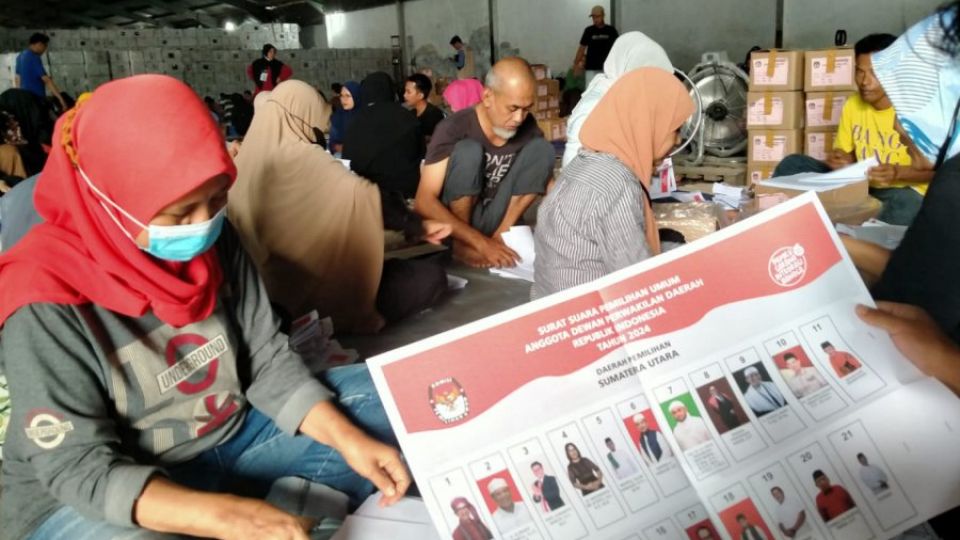January 23, 2024
JAKARTA – Ahead of the February general election, the General Elections Commission (KPU) regional offices have recruited workers to sort and fold millions of ballots, creating a new source of income for many.
Some 200 million people will vote in the simultaneous presidential and legislative elections on Feb. 14, during which each voter will get a set of five pre-folded ballots.
For one 38-year-old housewife in Central Jakarta, who refused to give her name for safety reasons, her first time as a recruited worker to sort and fold ballots under the KPU South Jakarta office was an enjoyable experience to “keep me busy as a housewife and generate additional income.”
The woman told The Jakarta Post that she could fold around four boxes of 500 ballots each, every day from morning until the sun had set.
“I know that I still have the energy to keep [sorting and folding more ballots a day],” she said in mid-January at the Sarinah logistics warehouse in Pancoran, where the ballots for the South Jakarta electoral district were sorted and folded. “But since I am a housewife and have children at home, I usually finish at maghrib [dusk].”
She said that two days after starting the job, her waist and legs were already sore as all workers were required to stand while folding the ballots, adding that: “If we [the workers] want to sit and have a drink, then we have to get out [of the warehouse].”
Asked about the wage for ballot folders, she said that KPU staff members had not told her the specific amount, but claimed that they would pay workers weekly.
Another recruited worker Samsudin, as kompas.com reported, claimed that he was paid Rp 135 (less than 1 US cent) for each ballot folded at the Sarinah warehouse.
Speeding up work
A total of 8.2 million voters across five municipalities and Thousand Islands regency in Jakarta will cast their ballots next month to choose Indonesia’s next president and vice president as well as members of House of Representatives, the Jakarta City Council and the Regional Representative Council.
KPU South Jakarta office head Muhammad Taqiyuddin said that per Jan. 10, workers in the Sarinah warehouse had sorted and folded about 1.6 million from the 7.2 million ballots to be prepared between Jan. 4 and Jan. 25.
To meet the target of folding around 300,000 to 350,000 ballots a day, Taqiyuddin said his office had recruited more residents, from only 104 people in the beginning to 133 workers as of Jan. 10.
“Before entering the warehouse, we [KPU staff] also ask [the workers] to undergo body checks to prevent them from carrying sharp objects, lighters and handphones which could damage the ballots or disrupt the [sorting and folding] process,” Taqiyuddin told the Post.
“After being sorted and folded, the ballots will be distributed [by the KPU] to the warehouses at the district level [before] they are sent to each polling station across South Jakarta,” he added.
KPU Jakarta office head for the planning and logistics division Nelvia Gustina said roughly 10.8 million ballots had been sorted and folded across the capital as of Jan. 10.
The agency, she said, had so far employed about 1,356 workers and “can still recruit more people for the sorting and folding jobs” because Jakarta was expected to finish the work earlier than the deadline of Jan. 25.
Neither Nelvia nor Taqiyuddin revealed how much the workers were paid, saying the authority to decide the amount fell on each KPU municipality office.
Nelvia, however, said that “the regional minimum wage is normally taken into consideration when setting wages for the workers.”
In Medan, North Sumatra, a resident of Medan Selayang district named Ridwan Ramadansyah said people could earn Rp 175,000 for every 500 pre-folded ballots for legislative elections and Rp 500,000 for every 2,000 ballots for presidential elections.
Ridwan himself had folded around 11,000 legislative ballots in the 11 days since he took the job on Jan. 6. “I estimate that I will get more than Rp 3 million for the job so far – that’s quite something,” he said at the warehouse of KPU Medan office on Tuesday night.
“It will be my biggest salary compared with other jobs I’ve done in the past,” he said, adding that the KPU Medan would pay the money on Jan. 25.
KPU Medan office head Mutia Atiqah said her office had so far employed 1,000 workers, mostly women.
According to a press release from the KPU national office, the poll body has completed the first phase of production and distribution of voting booths, ballot boxes and ink to all KPU warehouses across the nation.
Meanwhile, the second round of logistics, such as the pre-folded ballots, is expected to be delivered to each polling station by Feb. 13 at the latest, a day before voting day. (alf)


